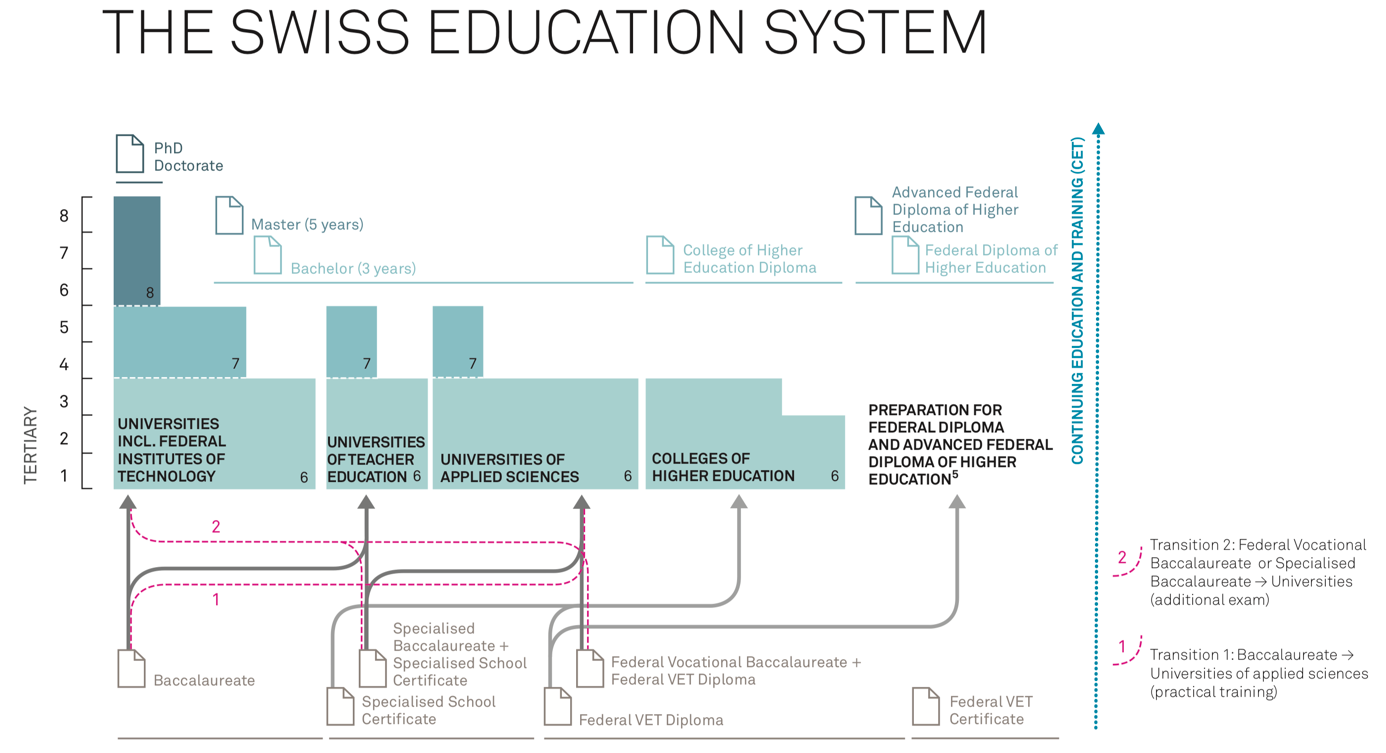Vocational training or degree? Employment rates are similar

In Switzerland, the number of people with a higher education degree is above the Organisation for Economic Co-operation and Development (OECD) average, but vocational training is still managing to hold its own.
For example, the employment rates in Switzerland of those who have finished obligatory school and opted for a vocational qualification are similar to those with a tertiary degree, according to the OECD’s global education report for 2019External link, which was released on Tuesday.
The results come at a time of debate over vocational versus academic education in Switzerland.
Tertiary on the rise
Tertiary educationExternal link – the highest level of education (at universities and professional education institutions) – is the main theme of this year’s OECD education at a glance report which compared 46 countries (OECD members and partner countries). It found that 44% of 25-64-year olds had a tertiary degree in Switzerland in 2018, compared with the 39% OECD average.
The share of tertiary educational attainment was higher among the younger generation and had risen by 13 percentage points over the last decade from 38% to 51%. This was along the lines of what is happening elsewhere in OECD member countries, which have also seen a tertiary education expansion among young people.
A land of PhDs
Switzerland was found to have the second highest share of doctorates among its population, at 3.2%, after Slovenia. Doctoral or equivalent programmes were highly attractive to international students who made up 55% of entrants, compared with 22% OECD average.
First-time tertiary entrants (bachelors’ level) also tended to be older than in other OECD countries at 25 (compared with 18 in Japan for example). “Deferred entry suggests a culture of lifelong learning and a preference for gaining working experience before entering tertiary education in Switzerland,” the OECD said in its country notes for Switzerland. External link
Employment prospects
An apprenticeship has traditionally been a strong option for young people in Switzerland. Around 2/3 of school leavers opt for this and the system allows students to gain higher professional qualifications or even go onto study later on.
+ Read here how it is possible to study after an apprenticeship
However, there has been pressure from some parents, often professionals or expats, for their children to go to baccalaureate school which prepares pupils for university.
According to the OECD, higher education leads to better employment prospects in Switzerland, but the impact is less pronounced above upper secondary (post-obligatory school, which finishes at 15/16) level.

More
From ETH to the University of Geneva: understanding Switzerland’s university system
Overall Swiss adults had a higher employment rate than the OECD average: among those with obligatory school education it was 69% compared with the 59% OECD average. For those with post-obligatory school vocational training the employment rate was 82% (OECD average 76%) compared with 89% (OECD: 85%) for those with tertiary education.
VET: still important
What is more, the transition from vocational upper secondary/post-secondary non-tertiary degree to tertiary qualifications (degrees and higher professional qualifications, a Swiss specialityExternal link) did “not lead to significant improvements in employment prospects”, the report noted. Among younger adults the difference in employment rate was three percentage points, half the OECD average.
“Such a small difference suggests a great interest within the country’s labour market in people with vocational education,” the OECD said. “For instance, in Switzerland, the majority of vocational students participate in combined school and work-based programmes, which smooth the transition from education to work”.
OECD’s stance
The OECD said on TuesdayExternal link that overall demand for tertiary education continues to rise in the countries surveyed, but further expansion is only possible if higher education steps up efforts to prepare students for the future (including technological advances, climate change and migration issues).
Some sectors in high demand may struggle to find the skills they need, especially in STEM (science, technology, engineering, maths) areas, it warns. Women are particularly under-represented here, a finding that also holds true for Switzerland.
Many institutions are evolving to meeting changing job market demands, such flexible pathways into tertiary education and working closely with industry, but larger enrolments need to be balanced against cost issues. Quality and relevance also need to be maintained, said the OECD.

In compliance with the JTI standards
More: SWI swissinfo.ch certified by the Journalism Trust Initiative






















You can find an overview of ongoing debates with our journalists here . Please join us!
If you want to start a conversation about a topic raised in this article or want to report factual errors, email us at english@swissinfo.ch.